Mojza Blog
SAT: The Complete Guide
by Zoella Ahmed | 6 nov 2022

Even though many may not grant much importance to the SAT, the truth is that a good SAT score is key to gaining admission to your dream university.
What is the SAT?
The SAT is a standardised test used worldwide for college/university admissions, including Pakistan. The highest score that can be attained is 1600 points, whereas the average score achieved is 1060 points. It essentially tests a high-school student’s readiness for college. Started in 1926, it is administered by CollegeBoard, a non-profit private organisation.

As of today, the SAT score is a crucial part of many university applications.
Until very recently, it was a conventional pen-and-paper test. However, a new improvement has seen the SAT go digital as well.
The first digital SAT will be held in March 2023.
Structure of the SAT
The SAT takes three hours and is mostly a multiple-choice test.
It has two sections:
Evidence-Based Reading
The evidence-based reading part, which is more commonly known as the ‘English’ part of the test, is subdivided into two further categories: the ‘Reading’ and ‘Writing and Language’ sections.
This is worth 800 points, and the base score is 400 points.
Reading:
This section is comprised of five
passages. Four of these will be read and answered separately, while a pair of passages will be read and answered as a whole (so six passages, technically).
Each passage will be about 500-700 words long.
There are a total of 52 multiple-choice questions to answer within 65 minutes .
The questions you get in this part may ask how the author uses evidence to support a claim, the meaning of a word in context, or to analyse in History/Social Studies and Science.
Your reading skills and vocabulary will truly be put to the test!
Writing and Language:
This part contains 4 passages of 400-450 words each. A total of 44 multiple-choice questions must be answered in 35 minutes. So, effective time management is essential.
There are two types of questions you face in this section: the ones where you have to enhance the expression of ideas, and the ones where you have to identify and correct errors in grammar, usage, sentence structure, and punctuation.
Maths
The maths portion is mostly multiple-choice, however, some questions may ask you to write down the answers (called grid-ins). This portion is also subdivided into two sections: the calculator and the no-calculator section.
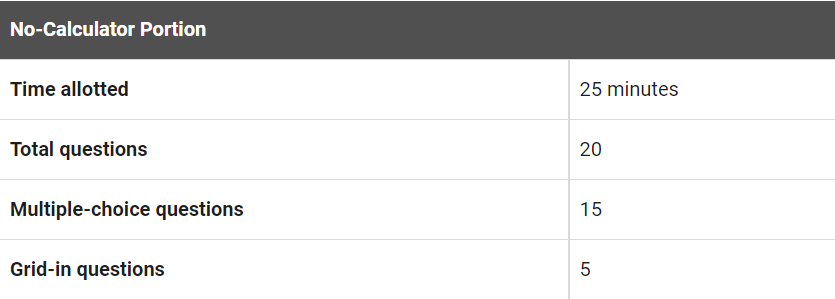
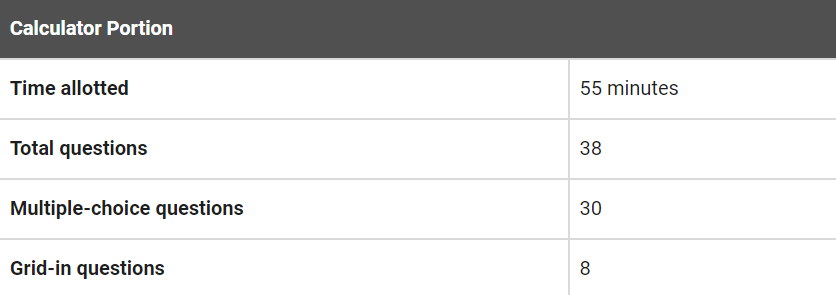
It is worth 800 points, and the base score is 400 points. And yes, common formulas will be provided for your ease.
The main topics are:
1. Heart of Algebra
This includes linear equations, systems of linear equations, and functions.
2. Problem-Solving and Data Analysis
This includes using ratios, percentages, and proportional reasoning to solve problems in real-world situations.
3. Passport to Advanced Math
This includes calculus and statistics.
4. Additional Topics in Math
This includes geometry, trigonometry, radian measure, and complex numbers.
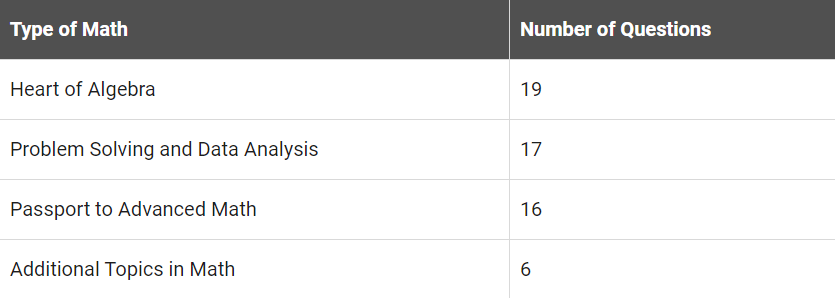
For in-depth information about each topic, head on over to the CollegeBoard website.
SAT Preparation
It’s never too late to start preparing for anything. Try to to dedicate at least 20-25 minutes daily to test prep, even if you don’t plan to give your SAT for a year or so. Remember: practice makes perfect!
YouTube channels:
Khan Academy SAT
SupertutorTV
StarTutors
Hayden Rhodea
Books:
CollegeBoard’s very own Official SAT Study Guide 2020 Edition, to help you review every skill and question type needed to ace your SAT-with eight total practice tests.
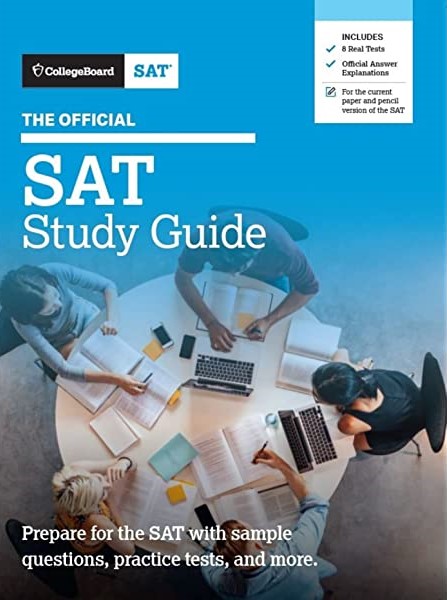
The SAT Prep Black Book: The Most Effective SAT Strategies Ever Published by Michael and Patrick Barrett is one of the most popular SAT prep books.
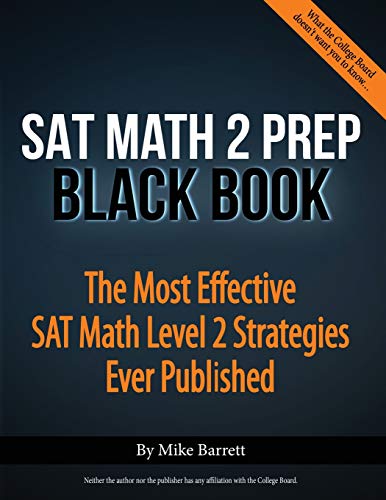
Websites:
Khan Academy:
Khan Academy, another private, non-profit organisation, has been partnering with CollegeBoard since the academic year 2015-2016 to provide free online SAT preparation to all.
It allows you to create a personalised schedule to practice daily.

It has short exercises for each topic with an explanation about which answer is correct and why, and vice versa.
It also allows you to have short, timed tests to calculate your skill level in each topic, a feature that can help you determine where your strengths and weaknesses lie.
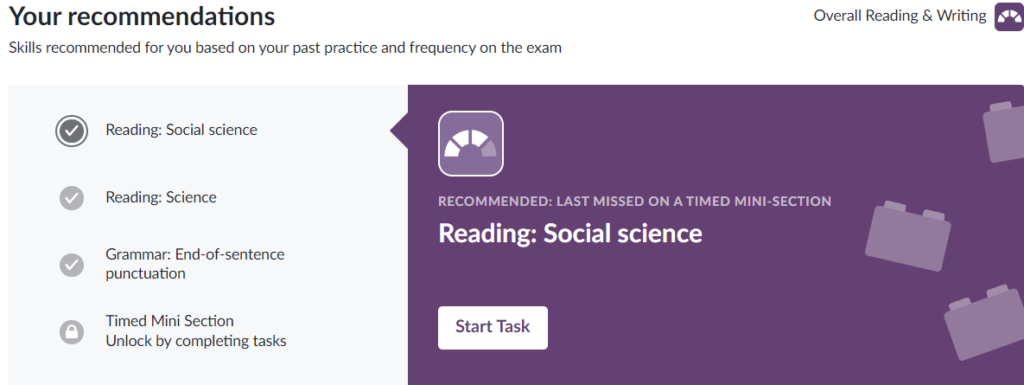
Furthermore, you can take full, 3-hour practice tests to see if you’re ready for the real deal.
Prepscholar:
PrepScholar is also another reputable organization, with methods created by 99th percentile-scorers to help you achieve the best results. The lessons are personalized and adapt to you as you learn. It offers easy to use tools, a plethora of explanation videos, and 24/7 help from their SAT advisers. The founders have mastered the SAT, and will ensure that you do, too, for a very small fee.
Practice papers:
If you’re done with the official practice papers, but still feel like you require more practice, you can visit PrepScholar for more unofficial ones.
Also, it may prove helpful to solve the past papers as well, which you can find here, because CollegeBoard often reuses older papers.
Best time to give the SAT?
SATs are held seven times a year in the United States, and six times a year internationally. Find out this year’s SAT test dates here.
Most students prefer to give their test during their AS-level, (or junior year of high school). This is a sagacious decision, as you will likely be stressed out by the burden of various other entrance tests, university/college applications, internships, and, of course, your CAIEs.
It is recommended to take two SAT tests, one in the spring of your second to last year, and the other in the fall of your last year, after which you plan to attend a university/college.
Whenever you decide to give it though, make sure you leave enough time for a retake should you need one.
The SAT test day
Here’s what to bring on your test day:
1. Your up-to-date admission ticket.
2. Acceptable photo ID
3. Two No. 2 pencils with erasers
4. An approved calculator
5. Your vaccination card
You can also bring:
A watch
Extra (calculator) batteries and stationary
A backpack
Some snacks and a drink
Epinephrine auto-injectors if required (there is no need to register for accomodations)
Make sure to eat a hearty meal before your test because it’s a long one.
In Pakistan, the only acceptable form of identification is your passport with your name, signature, and photograph, so make sure to have it made at least a month before your test date. The only exceptions are the U.S. Department of Defence (DoD) or a Common Access Card (CAC).
Make sure not to bring any:
Mobile phones, smart watches, or any other wearable devices
Devices that give out sound
Weapons or firearms
Highlighters, mechanical pencils, protractors, scissors, etc.
Unacceptable calculators
Earplugs
Paper
Cameras
Personal computing devices (unless it is a digital SAT)
Tips for attempting:
1. Time is of the essence. Divide your time between all the questions; this will help you complete your paper within the given time limit. Remember to leave some time for re-checking!
2. There’s no negative marking in the SAT, so it’s better to guess than to leave the question blank.
3. If you’re stuck on a question, don’t waste time on it. Solve the rest of the questions first and then come back to it again. You may be able to understand it better if you’re relieved of the pressure of the rest of the questions.
For further details, visit CollegeBoard’s site: What to Bring and Do on SAT Test Day
Accommodations for disabled students:
CollegeBoard offers a range of accommodations for students with verifiable disabilities, like Braille format tests, MP3 format tests, extended time, etc. Moreover, the examiners won’t know if the student received accommodations.
For more information, visit CollegeBoard’s accommodations site.
Sending SAT Scores
After you’ve completed the test and received your score, the next step is to send it to your desired colleges/universities.
Step 1: From your CollegeBoard account, go to the Send SATs page.
Step 2: Add colleges/universities to the score recipients list, then click Continue.
Step 3: Send your score. If you’ve taken the SAT more than once, you can choose to send your best score. However, many colleges/universities may require all your scores.
Step 4: Review your order. Check out.
You will be asked for a payment method and to agree to the terms and conditions.
You can send four free score reports up to 9 days after your test date if you registered for an SAT on the weekend.
Also, it must be noted that most colleges do not accept transcripts of your SAT scores and require them to be sent through your CollegeBoard account.
FAQs
Anyone. Whether you’re doing your O’ Levels or A’ Levels, you’re a middle-schooler or an adult, you can take the SAT. The only thing you should have is good knowledge of the topics, though one could say even that isn’t a requirement.
No test can be described as hard or easy. It all depends on the examinee’s knowledge. It is understandable that the SAT has a reputation for being a difficult test because of the severe time limits and the questions that are tailor-made to baffle you.
Registration fee for SAT-takers in the U.S. is currently USD 60 (approximately PKR 13,200 today), though it varies everywhere. In Pakistan, it is currently USD 109 (approximately PKR 24,150 today).
It is best, however, to consult the website
For the U.S: Registration fees
For other areas: Registration fees
Any score above about 1100 is considered a perfectly acceptable score, and obtaining a score of 1350 or above will probably put you among the top 10% test takers. Still, you should consult the website of your desired college/university and learn of their SAT score requirement.
The optional SAT essay was discontinued in June 2021, now only available in states where it’s required as a part of SAT School Day administrations.
The SAT subject tests have also been discontinued as of January 2021.
That depends on the college/university you are aiming for. If an SAT score is one of their admission requirements, then it is compulsory.
Mostly, only private universities require your SAT scores for admission.
SAT Registration
If you’re sure you’re ready, make an account and register for your SAT at the CollegeBoard website here.
Godspeed!
Acknowledgements
Author: Zoella Ahmed
Proofreaders: Emaan Asif, Rehan Ibrahim, Wardah Rasheed
Recent
Mojza
About Mojza
Mojza is a student-led organisation aiming to provide quality resources for Cambridge students.
Other than such weekly blogs, Mojza offers resources for your O levels, IGCSE, and A levels journey. We have notes from reputable teachers, our own original notes and a library of other helpful websites and resources!
Check out our home page!
Published 6 November 2022
Last Updated: 6 November 2022
Written by Zoella Ahmed

